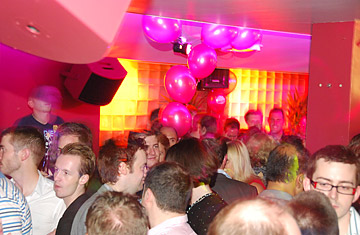
Partying at Britain's Conference Pride, the Conservative Party's first official conference gay night
Voters preparing to oust the weary old devil they know for a plausible young newcomer are apt to wonder if they're making the right decision. When the newcomer is David Cameron, the smoothly enigmatic leader of the Conservatives, a party once so damaged by a perceived lack of concern for Britain's most vulnerable people that its own chairwoman dubbed it the "Nasty Party," you can understand why voters want proof that the party has changed.
There was some pretty compelling evidence of a new direction at this week's Conservative Party conference in the northern city of Manchester, the last such showcase for the party ahead of expected elections next spring. Never mind the bombastic speeches and the relentless stream of policy announcements: the strongest indication that the Nasty Party might have gotten, well, a bit nicer was to be found at Conference Pride, a pumping, churning, balloon-festooned disco, billed as the Tories' "first official conference gay night."
Picking her way through gyrating bodies to deliver a welcoming speech, Shadow Equalities Minister Theresa May looked as if she'd dressed for the sort of genteel event more commonly associated with the Conservatives: a church fete or a sedate evening of sherry and nibbles. It was May, in her former job as Conservative chairwoman, who coined the epithet "Nasty Party" in 2002 to warn her colleagues that their moralizing traditionalism was turning off the wider electorate. The rift between the Tories and gay-rights supporters was especially wide following the passage of legislation by Prime Minister Margaret Thatcher's government in 1986 to bar the "promotion of homosexuality" in schools, an act that was repealed only after the Labour Party came into power in 1997. Adrian Rogers, a Conservative who ran unsuccessfully in that year's election against an openly gay Labour candidate, declared homosexuality to be a "sterile, disease-ridden and God-forsaken occupation."
So when May and other members of Cameron's top team turned out for the Pride festivities on Tuesday, Oct. 6, they wanted to demonstrate that such homophobia has been banished from the Tory ranks. Earlier this year, Cameron apologized for the 1986 legislation, known as Section 28, and even predicted that Britain's first gay Prime Minister would be a Tory. "If we do win the next election, instead of being a white, middle-class, middle-aged party, we will be far more diverse," he said.
That was music to the ears of many Tories, straight and gay, who have been trying for years to modernize their party. In 2000 Christina Dykes launched Absolutely Equal, a conference event that ran for a number of years and was supported by several minority-rights organizations, in an attempt to broaden her colleagues' focus. "After the bad defeats in 1997 and 2001, the party closed in on itself," she says. "We were just talking to ourselves." Matthew Parris, now a prominent writer and broadcaster, served as a Tory Parliament member during the Thatcher era and remembers when organizers of his party's gay-rights group refrained from spelling out the name of the organization on posters advertising its meetings, for fear of embarrassing attendees. The meetings, he says, took place "in damp basements, 30 or 40 of us drinking warm white wine and reassuring each other than the party was changing. It did turn out to be true."
In 2003, Iain Dale became the first openly gay Tory candidate to be selected for a winnable seat. (He lost, however, to the incumbent, a Liberal Democrat.) Now a blogger and publisher and hoping for another crack at Parliament, Dale co-hosted the Pride event. In his view, sexual orientation has become "a nonissue in the Conservative Party." He adds, optimistically, that equality will soon be so firmly embedded in the party that "in another 10 to 15 years there will be no need for Pride to make a statement."
Perhaps. But just as the Tories looked set to bury the old ghosts of their past, a new alliance in Europe has raised fresh questions about the party's stance on equality. Celebrities including actor Patrick Stewart and comedian Stephen Fry signed an open letter to Cameron on the eve of Conference Pride, challenging the Conservatives' decision to join the right-wing Polish Law and Justice Party in a new grouping in the European Parliament. "Your new Polish allies oppose gay marriage and adoption," read the letter, which demanded that Cameron call upon the Polish party "either to change their views or quit your new European group." Meanwhile, Ben Summerskill, director of the gay-rights group Stonewall, boycotted the event. Demonstrators accosted revelers arriving for the party, and a transvestite dressed as Thatcher invited curious bystanders to a simultaneous and hastily arranged counterevent called Tory Shame.
So amid the color and commotion, just how sincere is the Conservative transformation? Parris believes it's real but speaks of a "substantial unreconstructed rump" of the party whose skepticism about the European Union drove the alliance with the antifederalist Polish party and who are "only very grumblingly committed to the diversity agenda." How Cameron balances the demands of that rump against the drive of the modernizers will determine just how nice a party the Tories can be.
